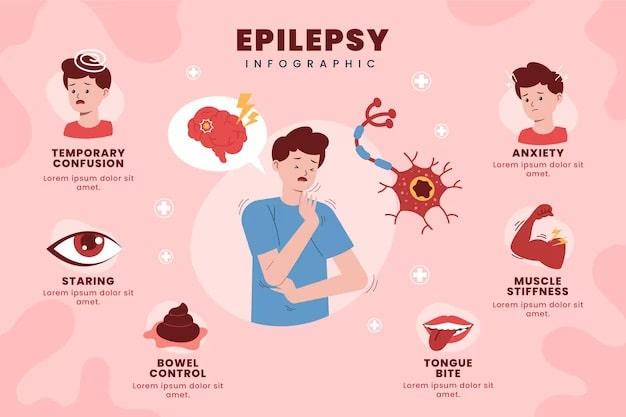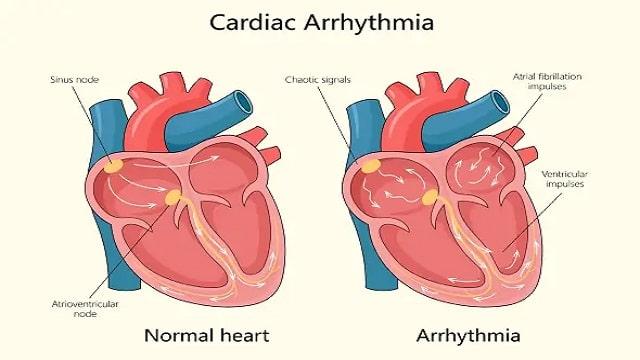
Epilepsy Symptoms, Risk Factors & Treatment | Diseases List A-Z
What is Epilepsy? Epilepsy is a condition that can cause someone to have repeated seizures.
Epilepsy can attack someone when there is damage or changes in the brain.
In the human brain, there are neurons or nerve cells that are part of the nervous system.
Each nerve cell communicates with each other using electrical impulses.
In cases of epilepsy, seizures occur when these electrical impulses are produced excessively, causing uncontrolled behavior or body movements.
In fact, epilepsy can happen to anyone.
This disease can affect people of all ages and all genders.
According to WHO, around 50 million people worldwide suffer from epilepsy, making it one of the most common neurological diseases in the world.
Symptoms of Epilepsy Recurrent seizures are the main symptom of epilepsy.
The characteristics of the seizures will vary and depend on which part of the brain is first affected and how far the damage has progressed.
Types of epileptic seizures are divided into two based on the disturbance in the brain, namely: 1.
Partial seizures In partial or focal seizures, only part of the brain is affected.
These partial seizures are divided into two categories, namely: Simple partial seizures This is a seizure in which the sufferer does not experience loss of consciousness.
Symptoms can include jerking limbs, or tingling sensations, dizziness, and flashes of light.
The part of the body that experiences seizures depends on which part of the brain is affected.
For example, if epilepsy disrupts the brain function that controls hand or foot movement, then only those two limbs will experience seizures.
Partial seizures can also cause sufferers to experience emotional changes, such as feeling suddenly happy or afraid.
Complex partial seizures Sometimes, focal seizures affect the sufferer’s awareness, making them appear confused or semi-conscious for a few moments.
This is called a complex partial seizure.
Other characteristics of a complex partial seizure are blank stares, swallowing, chewing, or rubbing hands.
2.
Generalized seizures In generalized or generalized seizures, symptoms occur throughout the body and are caused by a disorder that affects all parts of the brain.
The following are symptoms that can occur when someone has a generalized seizure: Eyes open during seizure.
Tonic seizures.
The body becomes stiff for a few seconds.
This may be accompanied by rhythmic movements of the arms and legs or nothing at all.
The muscles in the body, especially the arms, legs, and back, twitch.
Atonic seizures, where the body’s muscles suddenly relax, causing the sufferer to fall uncontrollably.
Clonic seizures, which are rhythmic jerking movements that usually affect the muscles of the neck, face, and arms.
Sometimes, people with epilepsy make noises or scream during a seizure.
Bedwetting.
Difficulty breathing for a while, so the body looks pale or even blue.
In some cases, a generalized seizure leaves the sufferer completely unconscious.
After regaining consciousness, the sufferer appears confused for several minutes or hours.
There is a type of epilepsy that is commonly experienced by children, known as absence epilepsy or petit mal.
Although this condition is not dangerous, the child’s academic performance and concentration can be disrupted.
The characteristics of this epilepsy are loss of consciousness for a few seconds, blinking or moving the lips, and a blank stare.
Children who experience these seizures will not be aware or remember what happened during the seizure.
Epilepsy Risk Factors Several factors that can potentially increase the risk of developing epilepsy include: Age.
Epilepsy is generally experienced by children and the elderly.
However, this condition can also be experienced by all groups who are at risk of developing epilepsy.
Genetics.
A family history of health problems can be a trigger for epilepsy.
Head injury.
Head injury can be one of the causes of epilepsy.
Stroke and vascular disease.
Stroke and other blood vessel (vascular) diseases can cause brain damage that can trigger this condition.
Dementia.
Brain infection.
Inflammation of the brain or spinal cord can increase the risk of developing epilepsy.
History of seizures in childhood.
Seizures can be caused by high fever.
In this condition, children are more susceptible to epilepsy.
Causes of Epilepsy Epilepsy can start at any age, generally this condition occurs since childhood.
Based on the cause, epilepsy is divided into two, namely: Idiopathic epilepsy, also known as primary epilepsy.
This is a type of epilepsy that has no known cause.
Some experts suspect that this condition is caused by genetic factors (hereditary).
Symptomatic epilepsy, also called secondary epilepsy.
This is a type of epilepsy that has a known cause.
A number of factors, such as severe head injury, brain tumors, and strokes are thought to cause secondary epilepsy.
Apart from the causes above, there are several other causes including: Immune disorders.
Conditions that cause the immune system to attack brain cells, called autoimmune diseases, can cause epilepsy.
Developmental disorders.
Birth defects that affect the brain are often the cause of epilepsy, especially in people whose seizures are not controlled with anti-seizure medications.
Diagnosis of Epilepsy The steps taken before the doctor makes a diagnosis include a physical examination, recording your medical history, asking about your activities, and possibly asking you to have a blood test.
Your doctor may also ask about your symptoms during your seizure and ask you or your family if you experience any of the following during your seizure: Brain jerk.
Muscle stiffness.
Urinating or defecating during a seizure.
Changes in breathing.
Skin color becomes pale.
Blank stare.
Loss of consciousness.
Difficulty speaking or understanding what people are saying to you.
In addition, doctors also perform several tests to find out how the brain is performing by checking: How to walk.
Muscle.
Sensitivity.
Thinking ability.
Next, the doctor will recommend the following tests, if you are suspected of having epilepsy, such as: EEG or electroencephalogram.
This is a test to find out the problem of electrical activity in the brain.
Blood tests.
These tests are useful for detecting signs of infection and other health problems.
Epilepsy Treatment Although epilepsy cannot be cured, there are many treatment options available.
As many as 70 percent of epilepsy sufferers can manage their disease with medication.
There are several treatments to control epilepsy ranging from taking anti-seizure drugs, special diets, to surgery.
Consumption of anti-seizure drugs This medication can control seizures in about 60 to 70 percent of people with epilepsy.
Your doctor may prescribe one or more anti-seizure medications, a dose of medication, or a combination of medications to find the best medication to control your seizures.
The choice of anti-seizure medication also depends on several things, such as: Types of seizures.
Previous response to anti-seizure medications.
Other medical conditions you have.
Potential interactions with other drugs currently being taken.
Side effects of anti-seizure drugs.
Age.
Overall health condition.
This is because some anti-seizure medications have been linked to birth defects.
Tell your doctor if you are pregnant or plan to become pregnant.
Special diet The ketogenic diet and the Atkins diet (a diet high in fat, moderate in protein, and low in carbohydrates) are two of the most common diets sometimes recommended for people with epilepsy.
Most diets are recommended for children whose medical treatment is ineffective and whose condition does not allow for surgery.
A low glycemic index diet may also reduce seizures in some people with epilepsy.
Operation Your doctor may consider surgery if anti-seizure medication does not control your seizures and your seizures get worse.
Epilepsy surgery can be a safe and effective treatment option when more than two trials of anti-seizure medications have failed to control seizures.
Epilepsy surgery options include: Surgical resection.
Removal of abnormal tissue.
Severance.
Cutting of the bundle of fibers that connects areas of the brain.
Stereotactic radiosurgery.
Targeted destruction of abnormal brain tissue.
Implantation of a neuromodulation device.
This device sends electrical impulses to the brain to reduce seizures over time.
Epilepsy Prevention Apart from medication, there are several ways that can be done to prevent epilepsy, such as: Drive safely This is done to prevent traumatic brain injury.
Be careful when doing activities.
For example, use a bicycle helmet when cycling and a motorcycle helmet when riding a motorbike, use a seat belt, and provide a child passenger seat.
This is done to reduce motor vehicle and traffic injuries.
Pay attention to the steps Falls are a major cause of brain injury.
Older adults and children are more likely to suffer a brain injury from a fall.
Treat injuries early Get help immediately if a traumatic brain injury occurs.
The risk of epilepsy is high in severe brain injuries.
Taking good care of injuries can help prevent epilepsy.
Healthy lifestyle Eating healthy foods, exercising such as walking every day, and not smoking can prevent epilepsy.
Apart from epilepsy, this healthy lifestyle can also reduce the risk of stroke and heart disease.
Vaccine Immunization, also known as a vaccine, can reduce the chances of getting an infection which can sometimes cause epilepsy.
Maintain cleanliness An infection called cysticercosis is the most common cause of epilepsy.
This disease is caused by a parasite and can be prevented through good hygiene and food preparation practices.
Health checks and early treatment of cysticercosis can prevent epilepsy.
Maintaining health during pregnancy Several problems during pregnancy and childbirth can cause epilepsy.
Follow a prenatal care plan with your obstetrician or nurse to keep yourself and your baby healthy.
When to See a Doctor? You need to contact a doctor if you experience the following symptoms of epilepsy: The seizure lasted more than 5 minutes.
Breathing or consciousness does not return after the seizure stops.
The second seizure occurred soon after.
High fever.
Heat exhaustion.
Is pregnant.
Have diabetes.
Injuring oneself during a seizure.
Still having seizures despite taking anti-seizure medication.
Having a seizure for the first time.
While it may be uncertain whether or not you have had a seizure, it is always a good idea to see a doctor right away if you suspect something or someone tells you about behavior you are not aware of.
.
Related Articles
health
Aquaphobia Symptoms, Risk Factors & Treatment | Diseases List A-Z
October 22, 2024

Aquaphobia is a type of specific phobia that is an irrational fear of something that does not pose much danger.
A person with aquaphobia has extreme fear or anxiety when thinking about or seeing water.
read morehealth
Arrhythmia Symptoms, Risk Factors & Treatment | Diseases List A-Z
October 22, 2024

Electrolyte imbalance in the blood.
Electrolyte levels, such as potassium, sodium, calcium, and magnesium can interfere with the heart’s electrical impulses, resulting in arrhythmias Drug use.
read morehealth
South Africa: Over 40 students hospitalised for suspected food poisoning
October 23, 2024

The information contained in this website is for general information purposes only.
The information is provided by BhaskarLive.
read more